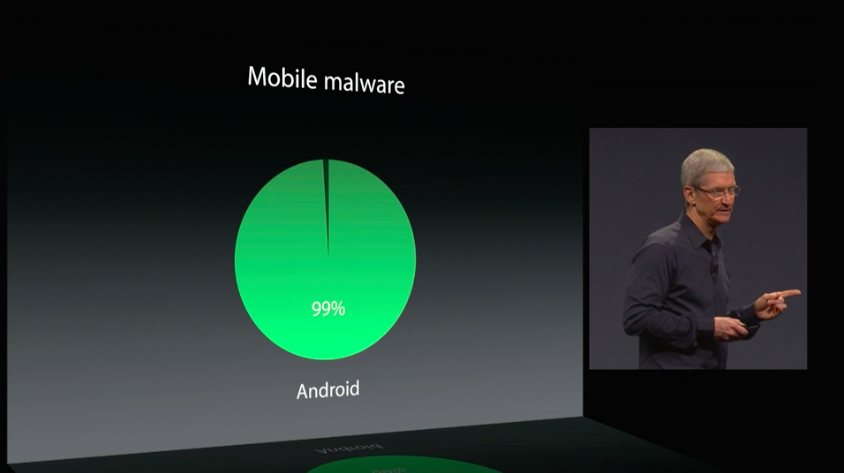WWDC 2014: Taking on Google and Android head-on
 |
| Image: Mac Daily News |
More third-party iOS integration to combat Android's openness
One thing Apple always maintained was total control of iOS. You couldn't share data between apps that Apple didn't bake into iOS, you couldn't set your favourite apps as defaults, you didn't have the option of third-party keyboards. Now, you can share data between any app, you can place third-party widgets in the notification centre, and you can use third-party keyboards too. Apple opening up to third party devs will allow iOS to grow. This proves to me that Apple finally realise that they can't do it all themselves. The company is opening up to devs to help take iOS to the next level. In a post I wrote 8 months ago, I said that a major flaw of Apple's closed ecosystem is that growth is severely restricted. Any improvements to iOS had to come from Apple. But now, with a much more open nature, and more power granted to third-party devs, iOS can be better even without Apple's direct input. Android was always open sourced, and it allowed the platform to grow and mature at such a rapid pace. iOS may not be as open as Android, but it's still a step in the right direction.
 |
| SwiftKey will now be available system wide on iOS 8. Image: SwiftKey |
Let's not beat around the bush now shall we? Many (all?) of the new features coming to iOS 8 came from Android (and some third party apps as well). Just read any of the links I shared in my intro and you'll see the similarities. It looks as though Apple is taking the if you can't beat 'em, join 'em approach with this move. Despite Apple and iSheep saying for years that iOS is better than Android, and that those Android features don't mean a thing, Apple is practically acknowledging that Android got it right by adding those very same features to iOS. Can't wait to see the iSheep saying that they love SwiftKey, the battery stats, widgets, "Hey Siri" hotword detection and all the other Android features they'll be getting.
It's almost poetic how Tim jabs Android for being "behind" then gushes over adopting its features minutes later. #WWDC2014
— Marques Brownlee (@MKBHD) June 2, 2014New Apple services to cut user dependence on Google services
Apple announced a lot of cloud-based multi-device services at WWDC, something which Google has a pretty strong grasp on. I made a post about this on Google+ a few days ago, so I'll just embed it.
With iOS 8, Apple is continuing to move away from Google
Remember when Apple took their first step away from Google with Apple Maps in iOS 6? No? Maybe this will refresh your memory on how bad it was. Then in iOS 7, Google Search was replaced by Bing in Siri. And now in iOS 8, Safari has yet another search engine alternative, DuckDuckGo. Google is still the default, but this addition is seen as another small step away from Google. iCloud Drive is a competitor to Google Drive, iCloud Photo Library is a competitor to Google+ Photos, "Hey Siri" is a competitor to "OK Google", which by the way, is available on iOS in case you didn't know. It's understandable why Apple would want to offer their own services instead of having their users rely on Google's, but as I already mentioned previously, only those fully invested in Apple's ecosystem will truly benefit from them, and it will be a major pain for anyone who wants to leave the ecosystem in the future.
Using scare tactics to pull Android users to iOS
You know how Microsoft tried its best to get people off Google's services with its Scroogled campaign? And how Microsoft tried to convince everyone that Chromebooks are useless? Only to have the market prove otherwise? Apple is kinda in the same boat, resorting to scare tactics at WWDC to try and convince people that Android is bad and evil and that iOS is best mobile platform you can have. Tim Cook talked all kinds of rubbish about Android, from malware to fragmentation, which is easily dismissed if you look beyond Apple's presentation and looked at the raw data. The fact that Tim Cook spent a significant amount of time bashing Android should show you just how big a threat he considers Android to be. If you truly believe that you have the best products in the market, you wouldn't need to resort to a smear campaign against your competitor.
 |
| Scaring people away from Android was on the agenda at WWDC. Image: Phandroid |
This year is shaping up to be the year where the iPhone starts looking more and more like an Android phone. We have well-known Android features coming in iOS 8, and it looks almost certain that the next iPhone will be similar in size to the majority of Android flagships. For all the trash talk Apple and iSheep spread about how the iPhone is better than Android phones, it looks like they'll pretty much be getting an "Android" phone made by Apple this year. Last year, WWDC reminded me why I left iOS. This year, Apple seem to be a moving in a new direction. Opening up iOS to third-party devs is certainly un-Apple-like, and porting Android features is akin to a hat tip to Google's Android team. By making iOS a lot more like Android, it's clear that Apple is going all out in their war against the world's most popular mobile platform. And with many new services to compete with Google's, Apple is clearly looking towards a possible future where Google is no longer in the picture.



Comments
Post a Comment